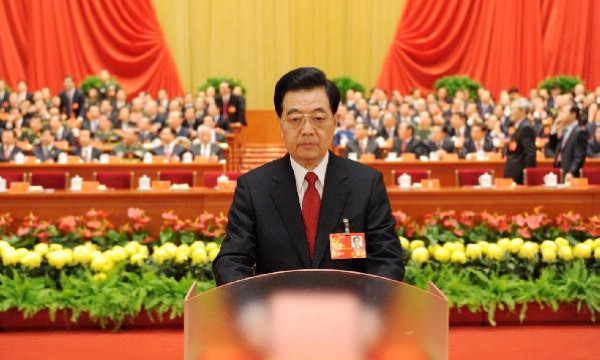State Council
(chinaculture.org)
Updated: 2011-10-19 15:59
State Council
The State Council of the People's Republic of China is the Central People's Government of the PRC. The Constitution stipulates that the State Council, that is, the Central People's Government of the PRC, is the executive body of the highest organ of state power; it is the highest organ of state administration.
The Composition of the State Council
The State Council of the PRC, established in 1954, developed from the Government Administrative Council of the Central People's Government in the early years of the People's Republic of China. According to the Constitution of 1954, the State Council is composed of the Premier; the Vice Premiers; the State Councilors; the Ministers in charge of ministries; the Ministers in charge of commissions; the Auditor General; and the Secretary General. In accordance with the Constitution of 1982, the State Council is born in the First Session of the NPC. The Premier of the State Council is nominated by the President of the PRC, decided by the NPC and appointed by the President of the PRC. The Vice Premiers, State Councilors, Ministers in charge of ministries or commissions, the Auditor-General and the Secretary-general of the State Council are nominated by the premier, decided by the NPC and appointed by the premier.
The term of office of the State Council is five years, the same as that of the National People's Congress. The Premier, Vice-Premiers and State Councilors shall serve no more than two consecutive terms.
The State Council is responsible and reports on its work to the NPC or, when the NPC is not in session, to its Standing Committee. The NPC has the power to remove from office members of the State Council.
The Functions and Powers of the State Council
According to the Constitution of 1982, the State Council exercises the following functions and powers:
(1) to adopt administrative measures, enact administrative rules and regulations, and issue decisions and orders in accordance with the Constitution and the law; and to submit proposals to the National People's Congress or its Standing Committee;
(2) to formulate the tasks and responsibilities of the ministries and commissions of the State Council, to exercise unified leadership over the work of the ministries and commissions and to direct all other administrative work of a national character that does not fall within the jurisdiction of the ministries and commissions; to exercise unified leadership over the work of local organs of state administration at various levels throughout the country, and to formulate the detailed division of functions and powers between the Central Government and the organs of state administration of provinces, autonomous regions, and municipalities directly under the Central Government; to alter or annul inappropriate orders, directives and regulations issued by the ministries or commissions; and to alter or annul inappropriate decisions and orders issued by local organs of state administration at various levels;
(3) to draw up and implement the plan for national economic and social development and the state budget; to direct and administer economic affairs and urban and rural development; to conduct foreign affairs and conclude treaties and agreements with foreign states; to direct and administer the building of national defense; to direct and administer the affairs of education, science, culture, public health, physical culture and family planning; to direct and administer civil affairs, public security, judicial administration, supervision and other related matters; to direct and administer affairs concerning the ethnic groups and to safeguard the equal rights of ethnic minorities and the right to autonomy of the ethnic autonomous areas; to protect the legitimate rights and interests of Chinese nationals residing abroad and protect the lawful rights and interests of returned overseas Chinese and of the family members of Chinese nationals residing abroad; to approve the geographic division of provinces, autonomous regions and municipalities directly under the Central Government, and to approve the establishment and geographic divisions of autonomous prefectures, counties, autonomous counties and cities; to decided on the imposition of martial law in parts of provinces, autonomous regions, and municipalities directly under the Central Government; and to examine and decide on the size of administrative organs and, in accordance with the law, to appoint or remove administrative officials, train them, appraise their performance and reward or punish them; and
(4) to exercise such other functions and powers as the National People's Congress or its Standing Committee may assign to it. Ministries, commissions, the People's Bank of China and administrations are departments that make up the State Council. Under the unified leadership of the State Council, they are in charge of directing and administering the administrative affairs in their respective areas and exercise prescribed state administrative powers. The Constitution of 1982 reads: The Ministers assume overall responsibility for the work of the ministries and commissions. Ministers in charge of the ministries or commissions of the State Council are responsible for the work of their respective departments and they convene and preside over ministerial meetings for general and executive meetings of the commissions to discuss and decide major issues in the work of their respective departments.
The ministries and commissions issues orders, directives and regulations within the jurisdiction of their respective departments in accordance with the law and the administrative rules and regulations, decisions and orders issued by the State Council.
The State Council establishes an auditing body to supervise through auditing the revenue and expenditure of all departments under the State Council and of the local governments at various levels, and the revenue and expenditure of all financial and monetary organizations, enterprises and institutions of the state. The State Council may establish special offices to assist the Premier to administer special affairs in light of requirements of work and the principle of streamlining.
Wen Jiabao is the current Premier of the State Council of the People's Republic of China.

Top News
Xi emphasizes adherence to CPC Congress spirit
Top legislator urges implementation of congress spirit
Moderately prosperous China brings chances to world
Video







